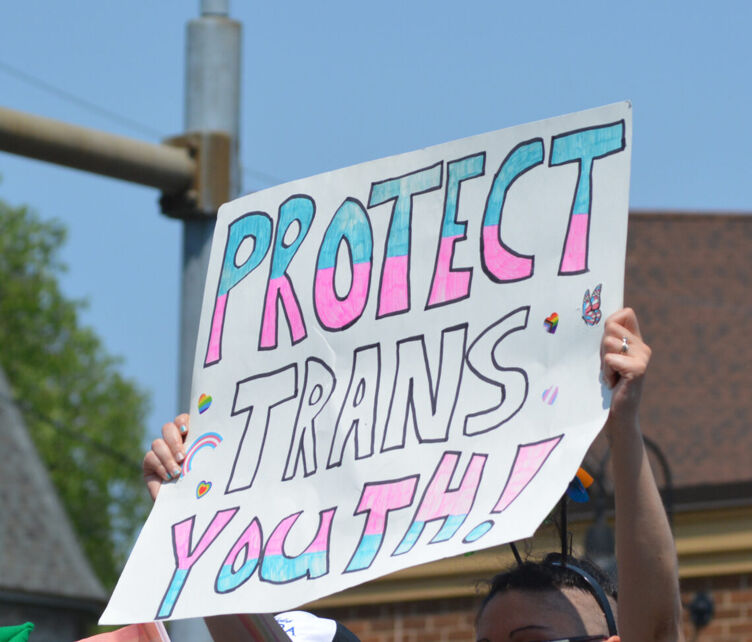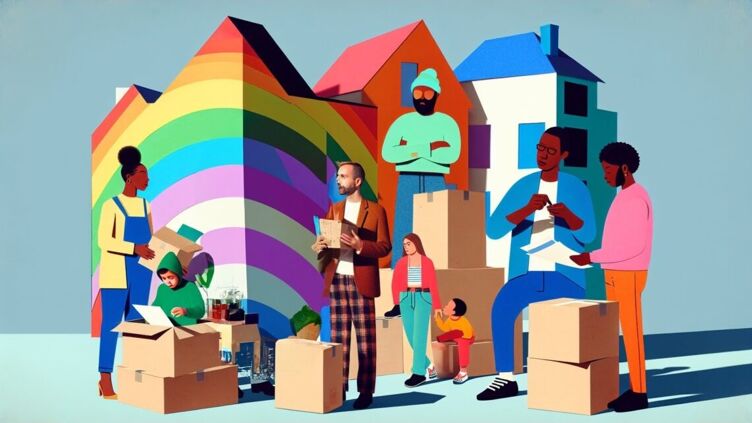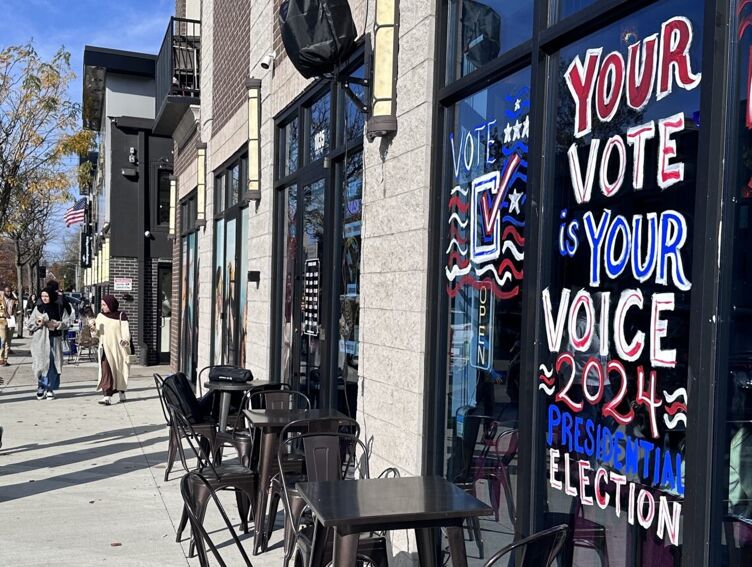On the frontline: Inside LGBTQ+ voters’ fight for rights in a divided America
Trans rights. The housing crisis. Voter suppression. Mental health. The LGBTQ+ community’s biggest concerns have dominated some candidates’ platforms and been weaponized by others. LGBTQ Nation engaged award-winning journalist and author Nico Lang to connect with queer folks across the country this election cycle and reveal how they’re mobilizing to ensure democracy and equality thrive in the future.
These tough conversations — from a mother forced to sleep in a van with her children after escaping Texas’s relentless legislative attacks on trans youth to a nonbinary Kansas resident facing challenges at the polls due to restrictive voter ID laws — project a nation divided. But Lang also discovered hope fueled by action. Grassroots LGBTQ+ organizations and national coalitions have united to demand change. The LGBTQ+ Victory Fund has endorsed nearly 500 candidates in 2024 who have canvassed their respective communities with visibility never seen before.
Take a closer look at what’s on the ballot through the eyes of those facing unimaginable hurdles yet who remain optimistic that the American Dream can become a reality.
Related:
Your LGBTQ+ guide to Election 2024
Stay ahead of the 2024 Election with our newsletter that covers candidates, issues, and perspectives that matter.
Red states worry about a ‘nightmare’ Trump presidency

Remi Buckley, an 18-year-old who lives in Alabama, cannot fathom what it would mean for those kinds of policies to be enacted. Although her state banned gender-affirming care for minors in April 2022, during the early days of her medical transition, she has still been able to access her hormone replacement therapy (HRT) through a Georgia-based telehealth provider. She has become more sociable and outgoing and no longer feels out of place as if she doesn’t belong anywhere she goes.
Having that newfound confidence taken away by a second Trump administration would be devastating. “It would feel like I have to hide myself away again, which is a way I don’t think anybody should have to live: acting like a ghost of their former self or of the person they want to be,” Buckley told LGBTQ Nation. “I don’t really know what I would do.”
Steven Rocha, a 23-year-old teacher in Florida, knows how difficult it is to see your state make it more difficult to be yourself. In 2023, Florida passed its infamous Parental Rights in Education Act, which initially banned teachers in K-3 classrooms from addressing topics related to the LGBTQ+ community.
“The bottom line is: A lot of trans people are going to get hurt under a Trump presidency,” Rocha told LGBTQ Nation. “That’s just a reality. Trans people are such a small minority, but our lives have just as much meaning and value as our cisgender counterparts. The stakes really could not be higher.”
Read more about the fight for trans health care.
The election could push LGBTQ+ mental health to the edge. Queer activists are fighting for a lifeline.

The mental health of LGBTQ+ youth and adults is likely to be profoundly affected by the outcome of the 2024 presidential race: If elected to the White House in November, former President Donald Trump has pledged to take federal action preventing trans youth from accessing gender-affirming care.
As the LGBTQ+ community nervously braces for an uncertain future, elected leaders are stressing the importance of prioritizing queer mental health as a political issue and raising increased visibility regarding the struggles that some community members are facing.
“It’s important to have people with lived experience at the table where decisions are made,” Minnesota state representative Brion Curran (D) told LGBTQ Nation. “It’s easy for some issues to get overlooked when there’s not a person in the room directly dealing with that issue. In politics, oftentimes, some of these healthcare issues don’t seem really flashy. They might get lost in the mix, and so it’s important that we have people like me with these life experiences in the room so that we can say, ‘Hey, we can’t forget about this.’ ”
Read more about the LGBTQ+ community and mental health.
The housing crisis hits especially hard for families fleeing red states to protect their trans kids

Amber Green and her children slept in their van after fleeing Texas over the state’s persecution of trans youth. Despite all they had been through, Green knew they had no choice but to stick it out in Connecticut. After Texas Gov. Greg Abbott (R) issued a February 2022 order directing the Department of Protective and Family Services to investigate parents of trans children for abuse, child welfare agents knocked on their door on three separate occasions. “There’s still that fear that we’re going to have to leave everything behind again,” Green told LGBTQ Nation.
Families of trans youth fleeing hostile states are currently facing a cost-of-living crisis as they are forced to move to progressive areas that are also more expensive. With the election upon us, many fear there is no clear answer on the horizon.
Many LGBTQ+ advocates say that federal action is needed to provide greater support to families who have been made refugees in their own country, and families of trans youth agree. Although 16 states now have laws or executive orders in place to shield parents and children from prosecution for seeking gender-affirming care, these states, in many cases, remain ill-equipped to meet the complex needs of families.
With a possible Kamala Harris presidency on the horizon, Kimberly Shappley — whose 13-year-old daughter, Kai, is a prominent trans youth activist — wants to see a potential Harris-Walz administration go further than President Joe Biden, who she feels has done little to protect families like hers. She believes the White House must offer guidance to trans sanctuary states so that they can respond effectively to the myriad ongoing crises that parents and children face.
“I don’t know how I’ll ever recover from all this, and I’m scared because I now have no savings,” Shappley told LGBTQ Nation. “I’ll never be able to retire. I am going to work until I’m 100 years old because I’m still trying to overcome what it has cost us to leave the South.”
Read more about the LGBTQ+ housing crisis.
Trans people face barriers at the polls. The LGBTQ+ community is helping knock them down.

As LGBTQ+ groups mobilize to engage queer voters, Wulf Roby knows firsthand that access to the voting booth cannot be taken for granted. Roby, a 39-year-old nonbinary advocate and community leader, says they were routinely refused the ability to vote before having their name legally changed in 2017. “It fed into those feelings of isolation and apathy,” Roby told LGBTQ Nation. “I felt like not just that my opinions didn’t matter but that people like me don’t belong here.”
LGBTQ+ organizers are laser-focused this year on making sure that queer voters, particularly those from the most marginalized populations, can overcome the myriad obstacles that may prevent them from participating in democracy.
“We are in a world where we have very tight elections, so every vote matters a great deal,” Jody Herman, senior scholar of public policy at the Williams Institute, told LGBTQ Nation. “We see in our estimates that the estimated number of trans people potentially impacted by voter ID laws could actually be larger than the margin of victory. It’s imperative that people who are eligible to vote are able to do so, and we need to make sure that all eligible voters have the opportunity to vote.”